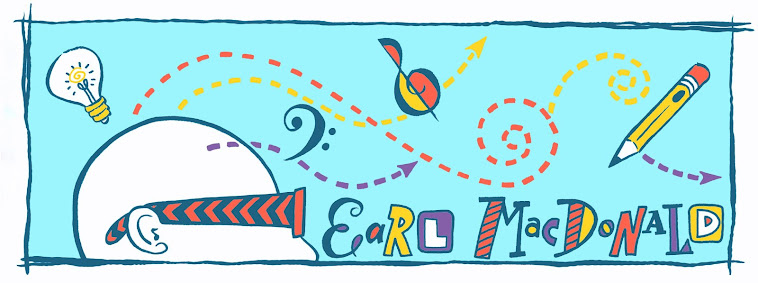Arranger, David Berger sent me this video on which he discusses the compositional habits of Duke Ellington, Bob Brookmeyer, Billy Byers, and Gil Evans. He also provides some insights into his own methods.
Like Berger, I am always on the lookout for proven, successful methods to incorporate into my own work. For my next writing project, composing a series of educational jazz band charts for high school and middle school groups, I will try adopting Ellington's practice of using a reduced score. I created the following template which is photocopied and ready to go:
I question if working this way might result in less combining of instruments across sections. But then again, if this truly was the method employed by Ellington and Strayhorn, they certainly were not orchestrationally impeded.
More and more I am drawn to the idea of returning to paper and pencil, rather than sitting at a computer, entering notes. The question is: To what degree will the process affect the imagined music?
I question if working this way might result in less combining of instruments across sections. But then again, if this truly was the method employed by Ellington and Strayhorn, they certainly were not orchestrationally impeded.
More and more I am drawn to the idea of returning to paper and pencil, rather than sitting at a computer, entering notes. The question is: To what degree will the process affect the imagined music?


Hi Earl,
ReplyDeleteI wrote for roughly 12 years directly into a computer. For the last 10 years +/-, I sketch primary ideas, transitional motives, etc. with a trusty mechanical pencil into a sketch score on good old manuscript paper. I then transfer this material into a sketch score template in Sibelius. The next step is to work on the architecture of the piece from beginning to end. Speaking of architecture, I'm a big fan of a text-based timeline of any piece so that I can compartmentalize the "global" issues (e.g, "Does this piece need more material to connect Point G to Point H to be structurally balanced?") from the "local" issues ("Is Fmi11 the best choice here?")
Once I'm convinced there is a good structural flow from beginning to end in the sketch score, I then start to orchestrate all the vertical elements, trying to stay flexible to deal with any late-breaking structural issues or possibilities that arise later in the process.
Back to your final question, I do think the working process certainly has an effect on the imagined final musical result. My experience with writing educational music is that, while the vocabulary and technical demands on the player are typically quite a bit more restricted, every musical choice by the writer requires even more deliberation in order to balance musical substance with the pedagogical goal of the piece as well as practical accessibility. Writing good music for educational purposes is challenging!
:) I'm sure your new stuff will work wonderfully.
Christmas blessings to all under the MacDonald roof,
Eric Richards
These are such valuable insights into your process, Eric! Thank you for sharing. I have tremendous respect for your work.
DeleteHi Earl,
ReplyDeleteLove the vids. As you probably knew, I sketch on 3 to 6 lines (depending on the size of the group and complexity of the piece) until almost everything except chair assignments was worked out. I often didn't sketch rhythm details, either, unless I was likely to forget what I intended. I still operate this way, with the only creative decisions made on the computer being rhythm section detail. I find that the "left brain" thinking process required to operate notation software prevented me from making proper creative decisions. I would be proceeding happily, thinking everything was going well, but in reality only the COMPUTER aspect was going well. I had fooled myself into thinking that if everything looked great onscreen, that it was good music too! Obviously, that was wrong.
My sketches are very... well... sketchy. They aren't meant to be seen by anyone except me, unlike Duke's sketches. I make liberal use of colla and come sopra and other shortcuts, and if I am intending a "mechanical" voicing (like a block) I often only indicate the voicing style. Sometimes I go back and fill it in before going to computer, but I can practically write a block in my sleep, so I don't find it necessary to sketch it most times. Unisons too, I can make octave decisions once on the computer.
I proceed from the point of view that at any time I can easily crumple it up and pitch it in the recycling bin, because it's only a single page, not the result of 8 hours of intense work. That idea is very liberating, so as a result I find I rarely have to trash anything. It's a great cure for writer's block!
Yet, I see some of my students and my daughter (who is in composition) cheerfully entering things directly into the computer without hesitation. Their "id" and "superego" seem to cooperate very well, unlike mine. I have to separate the creative process from the editing process.
Hi Chris. Thanks for sharing insight into your process! I love hearing how other arrangers work and totally agree that the computer can impede the creative flow. I'm glad I had the opportunity to study with you at McGill. (We won't tell anyone how long ago that was.)
Delete